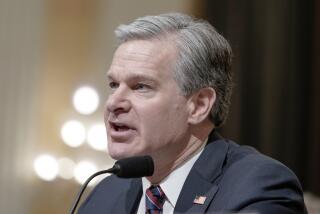CIA Director Warns of Terrorist Threat
- Share via
WASHINGTON — CIA Director George J. Tenet warned Congress on Tuesday that U.S. intelligence has detected signs that accused terrorist ringleader Osama bin Laden may be preparing to mount one or more attacks on Americans “at any time.”
In Senate testimony, Tenet said the spy agency has recently seen activities “similar to what occurred” before the bombings of U.S. embassies in Tanzania and Kenya in August that killed 224 people, including 12 Americans. The U.S. has indicted Bin Laden on conspiracy charges in the bombings.
Tenet warned that the Saudi dissident could turn to kidnapping or assassination in addition to using conventional explosives. Tenet said he is also concerned about the “serious prospect” that Bin Laden could acquire chemical or biological agents.
Tenet’s remarks, made as part of a presentation of worldwide threats to the United States, were the latest in a series of efforts to prepare public opinion for the prospect of attacks that some officials fear could inflict numerous U.S. casualties.
Tenet offered no elaboration on how intelligence agencies knew of Bin Laden’s supposed plans. They may have picked up clues from electronic eavesdropping or seen signs that some associates were traveling or transferring money in a way that suggested new assaults are planned, analysts said.
In December, U.S. forces in the Persian Gulf region were put on high alert after officials picked up hints that Bin Laden had given orders for associates to strike in that region.
Yet while U.S. officials insist that they have made Bin Laden’s life more difficult by pursuing him and his associates, they acknowledge that his businesses are still making money--and that his crusade against Americans is still underway.
“The fatwa that was declared last August is still in effect,” another U.S. official said, referring to Bin Laden’s announcement that an unidentified cleric had called for attacks on Americans. “We have to take him at his word.”
U.S. authorities view Bin Laden, who is believed to be in hiding in Afghanistan under the protection of the militant Islamic Taliban government, as one of the world’s most dangerous terrorists. In addition to the indictments, last month the U.S. government offered a $5-million reward for his capture.
“He has stated unequivocally that all Americans are targets,” Tenet told members of the Senate Armed Services Committee. “Bin Laden’s overreaching aim is to get the United States out of the Persian Gulf, but he will strike wherever in the world he thinks we are vulnerable.”
He noted that Bin Laden has said that it is a “religious duty” for the faithful to try to acquire nonconventional weapons to use against the United States.
Tenet’s warning comes at a time when the Clinton administration is sharply stepping up efforts to protect the United States from foreign attacks involving germ and chemical weapons, which could kill large numbers of Americans. The federal budget unveiled this week would increase spending to $1.4 billion for such civil defense efforts in fiscal 2000, and President Clinton has confessed his own nightmares about germ weapons.
David Schenker, an analyst at the Washington Institute for Near East Policy, noted that while the authorities have apparently been able to foil attacks and keep tabs on Bin Laden’s reputed network to a limited extent, “We can’t really get at him. It’s scary.”
Bruce Hoffman, a specialist on terrorism who is director of the Washington office of Rand Corp., said Tenet’s words “might also be designed to have a deterrent effect: ‘We’re watching, and we know what you’re doing.’ ”
Tenet also expressed alarm Tuesday about the threat posed by North Korea amid a continued decline in that country’s economy.
“Fresh signs of social decay have increased our concern about stability in North Korea,” he said. “Crime and indiscipline are commonplace, even in the military and security services.”
This, he said, has made the situation in the insular Stalinist regime “more volatile and unpredictable.”
He predicted that mounting problems will make North Koreans, including the elite, blame leader Kim Jong Il. And that, in turn, “will encourage the North to rely still more heavily on risky brinkmanship in its dealing with the United States,” he said.
Similarly, Tenet warned that Iran is more likely to “face serious unrest in 1999 than at any time since the [Islamic] revolution 20 years ago.”
The country’s moderate elements “are on the defensive to a greater degree than ever before in their struggle with the country’s conservatives.”
He cited a surge of political violence in Iran--a sign, he said, “that some conservative elements have decided to revert to force to impose their will.”
More to Read
Sign up for Essential California
The most important California stories and recommendations in your inbox every morning.
You may occasionally receive promotional content from the Los Angeles Times.











